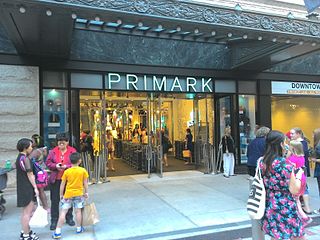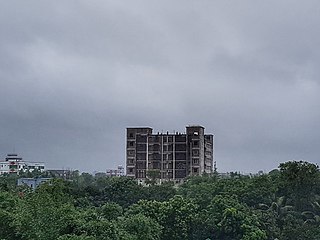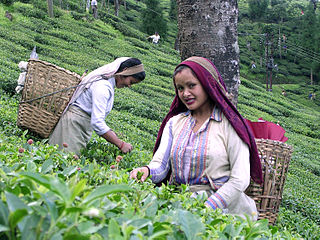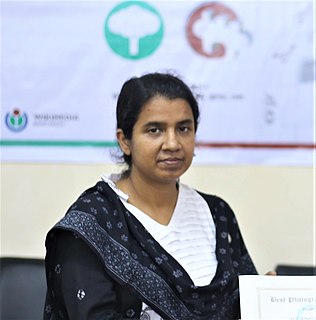
A sweatshop or sweat factory is a crowded workplace with very poor, socially unacceptable or illegal working conditions. The work may be difficult, dangerous, climatically challenging or underpaid. Workers in sweatshops may work long hours with low pay, regardless of laws mandating overtime pay or a minimum wage; child labor laws may also be violated. The Fair Labor Association's "2006 Annual Public Report" inspected factories for FLA compliance in 18 countries including Bangladesh, El Salvador, Colombia, Guatemala, Malaysia, Thailand, Tunisia, Turkey, China, India, Vietnam, Honduras, Indonesia, Brazil, Mexico, and the US. The U.S. Department of Labor's "2015 Findings on the Worst Forms of Child Labor" found that "18 countries did not meet the International Labour Organization's recommendation for an adequate number of inspectors."

Primark is an Irish fast fashion retailer with headquarters in Dublin, Ireland, and a subsidiary of the British food processing and retail company ABF. The company is named Penneys in the Republic of Ireland, where it was founded. The Penneys brand is not used outside of Ireland because it is owned elsewhere by American retailer J. C. Penney. The company has operations in Europe and the United States.

The International Labor Rights Forum (ILRF) is a nonprofit advocacy organization headquartered in Washington, D.C., U.S., that describes itself as "an advocate for and with the working poor around the world." ILRF, formerly the "International Labor Rights Education & Research Fund", was founded in 1986, and the organization's mission statement reads: "ILRF believes that all workers have the right to a safe working environment where they are treated with dignity and respect, and where they can organize freely to defend and promote their rights and interests. ILRF works to develop practical and effective tools to assist workers in winning enforcement of protections for their basic rights, and hold labor rights violators accountable."

The Children's Place Inc. is an American specialty retailer of children’s apparel and accessories. The company also markets apparel under the Children's Place, Place, Baby Place, and Gymboree brand names.

The textile and clothing industries provide a single source of growth in Bangladesh's rapidly developing economy. Exports of textiles and garments are the principal source of foreign exchange earnings. By 2002 exports of textiles, clothing, and ready-made garments (RMG) accounted for 77% of Bangladesh's total merchandise exports.
Dragon Group is a group of garment factories and other companies in Bangladesh. The group produces mainly for the international market and exports to more than 30 countries, especially the United States and Canada. Its subsidiary Dragon Sweater employs more than few thousand workers and in 2018 was the most traded stock on the Dhaka Stock Exchange.

Fair Wear Foundation is an independent multi-stakeholder organisation that works with garment brands, garment workers and industry influencers to improve labour conditions in garment factories. Receiving the Fair Wear stamp of approval does not guarantee any existing quality of labour standards, instead only demonstrating a stated interest in working toward improvement.

KiK, legally KiK Textilien und Non-Food GmbH, is a German textile discount store chain headquartered in Bönen.

The 2012 Dhaka garment factory fire broke out on 24 November 2012, in the Tazreen Fashion factory in the Ashulia district on the outskirts of Dhaka, Bangladesh. At least 117 people were confirmed dead in the fire, and over 200 were injured, making it the deadliest factory fire in the nation's history. The fire was initially presumed to be caused by an electrical short circuit, but Prime Minister Sheikh Hasina has since suspected that the fire had been arson and an act of "sabotage" due to the occurrence of previous comparable events. This event and others similar to it have led to numerous proposed reforms in workers' rights and safety laws in Bangladesh.
2013 (MMXIII) was a common year starting on Tuesday of the Gregorian calendar, the 2013th year of the Common Era (CE) and Anno Domini (AD) designations, the 13th year of the 3rd millennium, the 13th year of the 21st century, and the 4th year of the 2010s decade.

The 2013 Dhaka garment factory collapse was a structural failure that occurred on 24 April 2013 in the Savar Upazila of Dhaka District, Bangladesh, where an eight-story commercial building called Rana Plaza collapsed. The search for the dead ended on 13 May 2013 with a death toll of 1,134. Approximately 2,500 injured people were rescued from the building alive. It is considered the deadliest non-deliberate structural failure accident in modern human history and the deadliest garment-factory disaster in history.
The Accord on Fire and Building Safety in Bangladesh was signed on 15 May 2013. It is a five-year independent, legally binding agreement between global brands and retailers and trade unions designed to build a safe and healthy Bangladeshi Ready Made Garment (RMG) Industry. The agreement was created in the immediate aftermath of the Rana Plaza building collapse that led to the death of more than 1100 people and injured more than 2000. In June 2013, an implementation plan was agreed leading to the incorporation of the Bangladesh Accord Foundation in the Netherlands in October 2013.
Clothing industry or garment industry summarizes the types of trade and industry along the production and value chain of clothing and garments, starting with the textile industry, embellishment using embroidery, via the fashion industry to apparel retailers up to trade with second-hand clothes and textile recycling. The producing sectors build upon a wealth of clothing technology some of which, like the loom, the cotton gin, and the sewing machine heralded industrialization not only of the previous textile manufacturing practices.

Export-oriented employment refers to employment in multinational corporations' international industrial factories, usually located in developing countries. Such factories produce goods and services for sale in other countries. While these multinational producers have globally expanded women's access to employment, evidence suggests they do so by reinforcing traditional gender roles or creating new gender inequalities. Such gender inequities allow multinational firms to greater exploit profits per worker than they would otherwise due to the decreased labor cost. This decrease in the cost of labor comes as a result of the relegation of women to certain occupations. Studies show that in the quest for lower unit labor costs, export-oriented facilities create poor working conditions.

NASSA Group of Industries was founded in 1990 by Nazrul Islam Mazumder. It is one of Bangladesh's largest industrial conglomerate
The 2005 Dhaka garment factory collapse or Spectrum garment factory collapse was a structural failure that occurred on Monday, 11 April 2005 in the Savar Upazila of Dhaka, Bangladesh where a nine-story commercial building collapsed. The site is located about 30 km northwest of Dhaka. The explosion of a boiler on the ground floor triggered the collapse. The owner of the building was Shahriar Sayeed Husain, a Bangladeshi businessman.

Taslima Akhter is a Bangladeshi activist and photographer. She is a graduate of Dhaka University, as well as the photography school Pathshala. She is a member of several activist organizations. While documenting the Rana Plaza collapse in 2013, she took a photograph of a woman and a man who had died in each other's arms, which became emblematic of the incident.
The Garment Workers Unity Forum (GWUF) is a national trade union federation of garment workers in Bangladesh.
The National Garment Workers Federation (NGWF) is a registered national trade union federation of garment workers in Bangladesh. With 87 registered factory unions, it ifs considered one of the four main federations of garment workers' unions. NGWF is the initiator and a member of the Bangladesh Garments Workers Unity Council and a member of the Bangladesh Center for Workers' Solidarity. It is affiliated with the IndustriALL Global Union and one of the signatories of the Bangladesh Accord.
The Bangladesh Garments Workers Unity Council (BGWUC) is a national trade union centre in Bangladesh. The centre unites 21 garment worker trade union federations.












